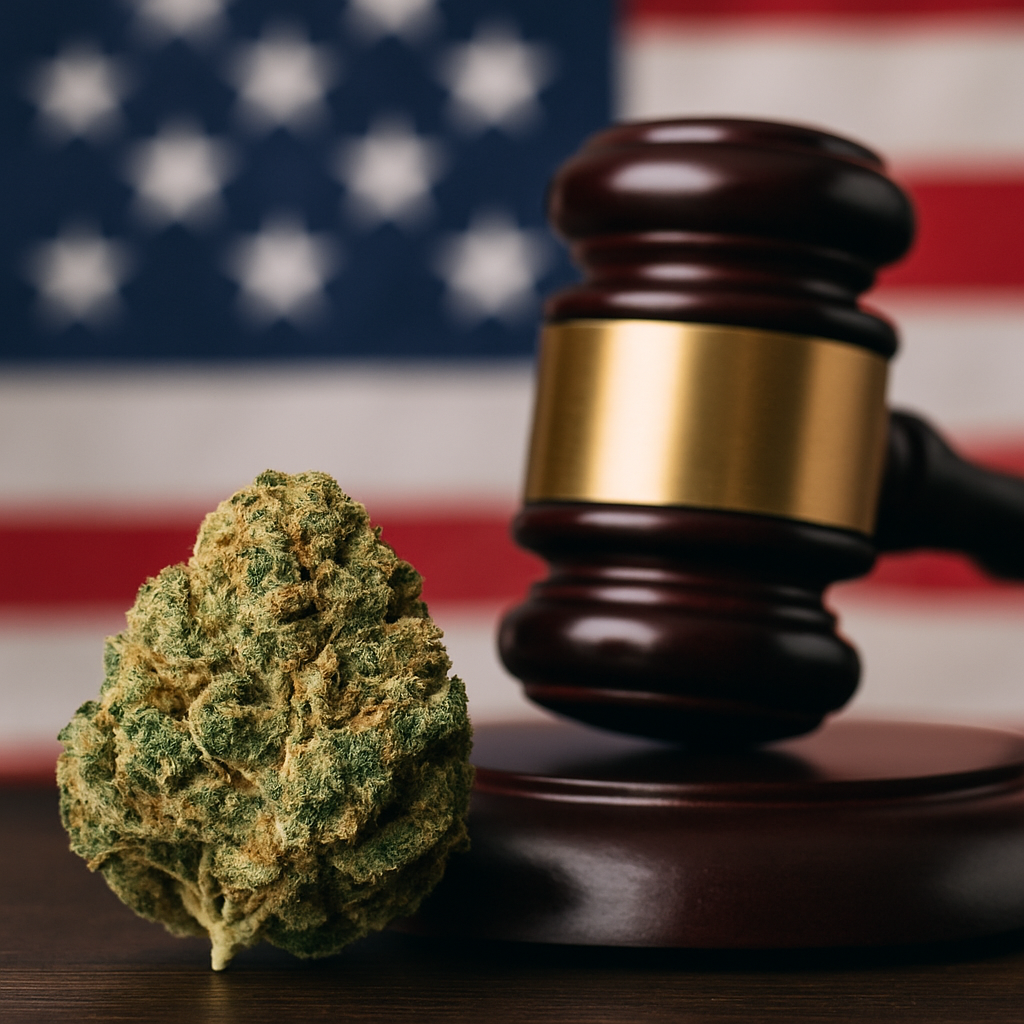Arizona’s cannabis market eyes marijuana policy shifts amid DOJ court briefs and rescheduling stalls under Trump.
Even when the Supreme Court isn’t directly hearing cannabis cases, litigation around gun rights, administrative procedure, and federal enforcement is drawing marijuana policy into the courtroom.
For Arizona’s legal cannabis operators, advocates, and consumers, the subtleties in these cases may shape federal shifts that could either expand access or entrench regulatory uncertainty—especially around banking.
According to recent commentary from MJBizDaily and Marijuana Moment, legal briefs filed by the Department of Justice (DOJ) are becoming a kind of divination tool.
Though these filings often touch on marijuana only peripherally, their arguments sometimes hint at how a Trump-led administration may navigate cannabis policy—especially in contrast to the Biden-era momentum around rescheduling.
But observers warn against overreading the tea leaves. The attorneys drafting these briefs are often career DOJ staffers, working with established precedent rather than signaling real-time policy shifts. Nonetheless, the context—and contradictions—matter.
Legal Maneuvers: Reading the Tea Leaves
One of the clearest examples comes from appellate litigation involving the Controlled Substances Act (CSA) and its application in unrelated constitutional cases. In recent months, DOJ filings have repeatedly reaffirmed the legality of federal cannabis prohibition under the CSA, even in states where marijuana is fully legalized.
Though these cases aren’t about cannabis per se, the DOJ’s continued reliance on the 2005 Supreme Court decision in Gonzales v. Raich keeps marijuana prohibition on firm federal footing. In Raich, the Court upheld Congress’ authority to criminalize homegrown medical cannabis under the CSA, despite California’s medical-use law.
The persistence of this legal framework remains troubling for Arizona businesses, especially those attempting to engage in interstate commerce or explore national banking relationships. When DOJ briefs double down on Raich, they implicitly reinforce the federal-state clash that continues to choke off safe banking access.
Mixed Signals: Rescheduling and Appointments
While Trump has publicly suggested he’s open to reclassifying marijuana under federal law, his personnel choices tell another story. His current nominee to head the DEA, Terrance Cole, has offered little more than vague statements about “prioritizing careful review” of the rescheduling petition launched under President Biden.
In the meantime, Acting DEA Administrator Robert Murphy has not advanced the rulemaking process that would shift marijuana from Schedule I to Schedule III. No briefing schedule has been issued as of August 2025, and insiders suggest the Trump DOJ may prefer strategic inaction—allowing the rescheduling process to stagnate without issuing a formal denial.
This bureaucratic purgatory leaves Arizona’s cannabis industry in limbo. Without rescheduling, banks remain wary of servicing dispensaries and grow operations. That means continued reliance on cash, high insurance premiums, and limited access to business loans. Even companies operating fully within Arizona law face significant financial risk due to this federal freeze.
Policy Precedents: The Shadow of Sessions and the Farm Bill
Federal marijuana policy under Trump is shaped not only by what the administration does now, but also by what it did—or undid—in its first term.
One of the clearest examples is the 2018 rescission of the Cole Memo. Originally issued under the Obama administration, the Cole Memo instructed federal prosecutors to deprioritize cannabis enforcement in states with robust regulatory systems. When then-Attorney General Jeff Sessions tore it up, it sent a chilling signal: federal enforcement discretion could change overnight, leaving state-legal operators exposed.
Contrast that with the 2018 Farm Bill, which legalized hemp and hemp-derived cannabinoids containing less than 0.3% THC. That legislation was widely seen as a cautious but meaningful step toward broader cannabis reform. In Arizona, it opened the door to a wave of CBD businesses and agricultural ventures.
These contrasting moves—one reinforcing prohibition, the other enabling limited legalization—embody the contradictions that still plague marijuana policy under Republican leadership.
Legal Flashpoints: Recent Decisions and Pending Appeals
On May 27, 2025, the First U.S. Circuit Court of Appeals handed down its decision in Canna Provisions Inc. v. Garland, rejecting arguments from Massachusetts cannabis companies who argued that the CSA’s blanket prohibition on marijuana violates the Commerce Clause and the Tenth Amendment.
The court reaffirmed Raich and stressed that while Congress has allowed some flexibility—such as the Rohrabacher-Blumenauer amendment blocking DOJ interference in state medical marijuana programs—the underlying federal prohibition remains intact.
The plaintiffs are preparing to appeal to the Supreme Court, potentially forcing a reevaluation of Raich. If SCOTUS grants certiorari, it could trigger the most consequential marijuana policy ruling in decades.
Meanwhile, other appellate cases involving interstate licensing restrictions and cannabis-related firearm prohibitions continue to wend through the courts. While they may not be directly about marijuana legalization, their implications could ripple into how dispensaries operate, how products cross state lines, and how state laws survive federal scrutiny.
In Arizona, the stakes are high. Legal clarity at the federal level could determine whether dispensaries gain safe harbor to grow, bank, and expand—or whether they remain boxed into a patchwork regulatory cage.
The Strategic Pause: Rescheduling in Holding Pattern
Under the Biden administration, the DOJ launched a formal review of marijuana’s Schedule I classification. That review concluded in late spring 2024, with the Department of Health and Human Services recommending reclassification to Schedule III.
Yet since Trump reentered the White House, that process has stalled. The DEA’s silence is legally permissible but politically loaded. Without a denial or approval, rescheduling exists in a legal limbo that frustrates state regulators and emboldens prohibitionist factions.
In Arizona, the delay exacerbates existing stressors. Banking access remains limited, credit card companies won’t touch dispensary transactions, and cannabis businesses are unable to deduct ordinary business expenses under IRS Code 280E—a situation that would change under Schedule III.
For an industry that has brought in over a billion dollars in tax revenue and employs thousands across Arizona, the federal pause feels less like caution and more like calculated neglect.
Legal Briefs as Accidental Policy Windows
Ultimately, court filings—even in cases not directly about cannabis—offer some of the clearest views into the federal government’s posture on marijuana. Whether in Raich-based arguments, statements about scheduling authority, or subtle refusals to engage, the DOJ’s written record builds a narrative.
But these briefs reflect more than just legal reasoning. They often telegraph the administration’s comfort with the status quo. Inaction becomes the strategy.
Still, that may be changing. Mounting pressure from the courts, from Congress, and from economic sectors invested in cannabis reform could force clarity. If Trump supports rescheduling—even symbolically—or if the Supreme Court takes up a challenge to Raich, a clearer marijuana policy may emerge.
Alternatively, the administration may opt for a quiet compromise: a soft pivot via Schedule III rescheduling that offers banking relief and tax reform without inviting full-scale legalization debates.
Waiting for Washington
Arizona’s cannabis sector, like much of the nation, waits. While dispensaries thrive locally and Trap Culture continues to elevate weed lifestyle events from Phoenix to Tucson, the lack of federal clarity keeps the industry on edge.
Until the DOJ either moves forward with rescheduling or the Supreme Court takes up a case that forces doctrinal change, stakeholders must navigate a murky middle ground. Court briefs, legal footnotes, and staffing choices may not be policy statements—but in the Trump era, they might be the closest thing we get.
For Arizona’s cannabis businesses, clarity can’t come soon enough. Whether through legal pressure, political calculation, or pure inertia, marijuana policy is shifting. The question is whether it will shift in time for the state’s green economy to flourish beyond the cash-only confines it currently occupies.

***
GreenPharms is more than just a dispensary. We are a family-owned and operated company that cultivates, processes, and sells high-quality cannabis products in Arizona. Whether you are looking for medical or recreational marijuana, we have something for everyone. From flower, edibles, concentrates, and topicals, to accessories, apparel, and education, we offer a wide range of marijuana strains, products and services to suit your needs and preferences. Our friendly and knowledgeable staff are always ready to assist you and answer any questions you may have. Visit our dispensaries in Mesa and Flagstaff, or shop online and get your order delivered to your door. At GreenPharms, we are cultivating a different kind of care.
Follow us on social media






